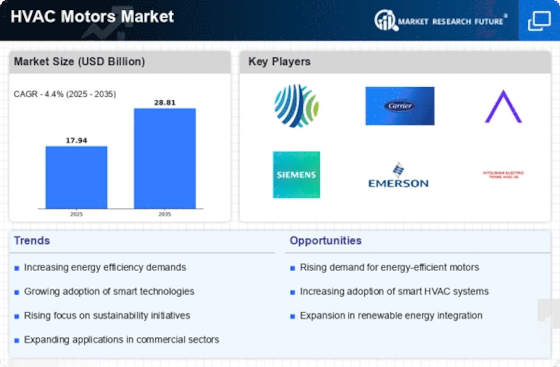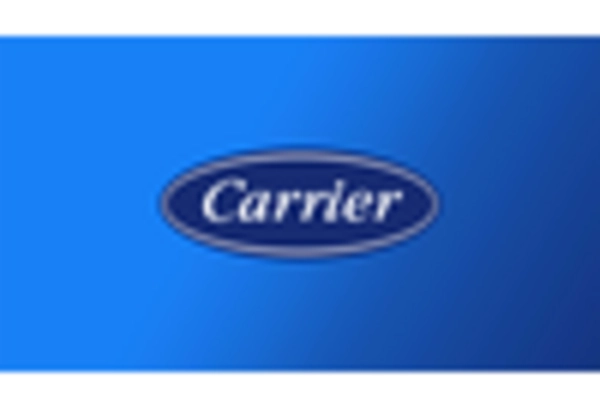Heating
Ventilation
Air Conditioning
Refrigeration
AC Motors
DC Motors
Universal Motors
Residential
Commercial
Industrial
Less than 1 HP
1-5 HP
5-10 HP
Above 10 HP
North America
Europe
South America
Asia Pacific
Middle East and Africa
North America Outlook (USD Billion, 2019-2032)
HVAC motors Market by Application Type
Heating
Ventilation
Air Conditioning
Refrigeration
HVAC motors Market by Type
AC Motors
DC Motors
Universal Motors
HVAC motors Market by End Use Type
Residential
Commercial
Industrial
HVAC motors Market by Power Rating Type
Less than 1 HP
1-5 HP
5-10 HP
Above 10 HP
HVAC motors Market by Regional Type
US
Canada
US Outlook (USD Billion, 2019-2032)
HVAC motors Market by Application Type
Heating
Ventilation
Air Conditioning
Refrigeration
HVAC motors Market by Type
AC Motors
DC Motors
Universal Motors
HVAC motors Market by End Use Type
Residential
Commercial
Industrial
HVAC motors Market by Power Rating Type
Less than 1 HP
1-5 HP
5-10 HP
Above 10 HP
CANADA Outlook (USD Billion, 2019-2032)
HVAC motors Market by Application Type
Heating
Ventilation
Air Conditioning
Refrigeration
HVAC motors Market by Type
AC Motors
DC Motors
Universal Motors
HVAC motors Market by End Use Type
Residential
Commercial
Industrial
HVAC motors Market by Power Rating Type
Less than 1 HP
1-5 HP
5-10 HP
Above 10 HP
Europe Outlook (USD Billion, 2019-2032)
HVAC motors Market by Application Type
Heating
Ventilation
Air Conditioning
Refrigeration
HVAC motors Market by Type
AC Motors
DC Motors
Universal Motors
HVAC motors Market by End Use Type
Residential
Commercial
Industrial
HVAC motors Market by Power Rating Type
Less than 1 HP
1-5 HP
5-10 HP
Above 10 HP
HVAC motors Market by Regional Type
Germany
UK
France
Russia
Italy
Spain
Rest of Europe
GERMANY Outlook (USD Billion, 2019-2032)
HVAC motors Market by Application Type
Heating
Ventilation
Air Conditioning
Refrigeration
HVAC motors Market by Type
AC Motors
DC Motors
Universal Motors
HVAC motors Market by End Use Type
Residential
Commercial
Industrial
HVAC motors Market by Power Rating Type
Less than 1 HP
1-5 HP
5-10 HP
Above 10 HP
UK Outlook (USD Billion, 2019-2032)
HVAC motors Market by Application Type
Heating
Ventilation
Air Conditioning
Refrigeration
HVAC motors Market by Type
AC Motors
DC Motors
Universal Motors
HVAC motors Market by End Use Type
Residential
Commercial
Industrial
HVAC motors Market by Power Rating Type
Less than 1 HP
1-5 HP
5-10 HP
Above 10 HP
FRANCE Outlook (USD Billion, 2019-2032)
HVAC motors Market by Application Type
Heating
Ventilation
Air Conditioning
Refrigeration
HVAC motors Market by Type
AC Motors
DC Motors
Universal Motors
HVAC motors Market by End Use Type
Residential
Commercial
Industrial
HVAC motors Market by Power Rating Type
Less than 1 HP
1-5 HP
5-10 HP
Above 10 HP
RUSSIA Outlook (USD Billion, 2019-2032)
HVAC motors Market by Application Type
Heating
Ventilation
Air Conditioning
Refrigeration
HVAC motors Market by Type
AC Motors
DC Motors
Universal Motors
HVAC motors Market by End Use Type
Residential
Commercial
Industrial
HVAC motors Market by Power Rating Type
Less than 1 HP
1-5 HP
5-10 HP
Above 10 HP
ITALY Outlook (USD Billion, 2019-2032)
HVAC motors Market by Application Type
Heating
Ventilation
Air Conditioning
Refrigeration
HVAC motors Market by Type
AC Motors
DC Motors
Universal Motors
HVAC motors Market by End Use Type
Residential
Commercial
Industrial
HVAC motors Market by Power Rating Type
Less than 1 HP
1-5 HP
5-10 HP
Above 10 HP
SPAIN Outlook (USD Billion, 2019-2032)
HVAC motors Market by Application Type
Heating
Ventilation
Air Conditioning
Refrigeration
HVAC motors Market by Type
AC Motors
DC Motors
Universal Motors
HVAC motors Market by End Use Type
Residential
Commercial
Industrial
HVAC motors Market by Power Rating Type
Less than 1 HP
1-5 HP
5-10 HP
Above 10 HP
REST OF EUROPE Outlook (USD Billion, 2019-2032)
HVAC motors Market by Application Type
Heating
Ventilation
Air Conditioning
Refrigeration
HVAC motors Market by Type
AC Motors
DC Motors
Universal Motors
HVAC motors Market by End Use Type
Residential
Commercial
Industrial
HVAC motors Market by Power Rating Type
Less than 1 HP
1-5 HP
5-10 HP
Above 10 HP
APAC Outlook (USD Billion, 2019-2032)
HVAC motors Market by Application Type
Heating
Ventilation
Air Conditioning
Refrigeration
HVAC motors Market by Type
AC Motors
DC Motors
Universal Motors
HVAC motors Market by End Use Type
Residential
Commercial
Industrial
HVAC motors Market by Power Rating Type
Less than 1 HP
1-5 HP
5-10 HP
Above 10 HP
HVAC motors Market by Regional Type
China
India
Japan
South Korea
Malaysia
Thailand
Indonesia
Rest of APAC
CHINA Outlook (USD Billion, 2019-2032)
HVAC motors Market by Application Type
Heating
Ventilation
Air Conditioning
Refrigeration
HVAC motors Market by Type
AC Motors
DC Motors
Universal Motors
HVAC motors Market by End Use Type
Residential
Commercial
Industrial
HVAC motors Market by Power Rating Type
Less than 1 HP
1-5 HP
5-10 HP
Above 10 HP
INDIA Outlook (USD Billion, 2019-2032)
HVAC motors Market by Application Type
Heating
Ventilation
Air Conditioning
Refrigeration
HVAC motors Market by Type
AC Motors
DC Motors
Universal Motors
HVAC motors Market by End Use Type
Residential
Commercial
Industrial
HVAC motors Market by Power Rating Type
Less than 1 HP
1-5 HP
5-10 HP
Above 10 HP
JAPAN Outlook (USD Billion, 2019-2032)
HVAC motors Market by Application Type
Heating
Ventilation
Air Conditioning
Refrigeration
HVAC motors Market by Type
AC Motors
DC Motors
Universal Motors
HVAC motors Market by End Use Type
Residential
Commercial
Industrial
HVAC motors Market by Power Rating Type
Less than 1 HP
1-5 HP
5-10 HP
Above 10 HP
SOUTH KOREA Outlook (USD Billion, 2019-2032)
HVAC motors Market by Application Type
Heating
Ventilation
Air Conditioning
Refrigeration
HVAC motors Market by Type
AC Motors
DC Motors
Universal Motors
HVAC motors Market by End Use Type
Residential
Commercial
Industrial
HVAC motors Market by Power Rating Type
Less than 1 HP
1-5 HP
5-10 HP
Above 10 HP
MALAYSIA Outlook (USD Billion, 2019-2032)
HVAC motors Market by Application Type
Heating
Ventilation
Air Conditioning
Refrigeration
HVAC motors Market by Type
AC Motors
DC Motors
Universal Motors
HVAC motors Market by End Use Type
Residential
Commercial
Industrial
HVAC motors Market by Power Rating Type
Less than 1 HP
1-5 HP
5-10 HP
Above 10 HP
THAILAND Outlook (USD Billion, 2019-2032)
HVAC motors Market by Application Type
Heating
Ventilation
Air Conditioning
Refrigeration
HVAC motors Market by Type
AC Motors
DC Motors
Universal Motors
HVAC motors Market by End Use Type
Residential
Commercial
Industrial
HVAC motors Market by Power Rating Type
Less than 1 HP
1-5 HP
5-10 HP
Above 10 HP
INDONESIA Outlook (USD Billion, 2019-2032)
HVAC motors Market by Application Type
Heating
Ventilation
Air Conditioning
Refrigeration
HVAC motors Market by Type
AC Motors
DC Motors
Universal Motors
HVAC motors Market by End Use Type
Residential
Commercial
Industrial
HVAC motors Market by Power Rating Type
Less than 1 HP
1-5 HP
5-10 HP
Above 10 HP
REST OF APAC Outlook (USD Billion, 2019-2032)
HVAC motors Market by Application Type
Heating
Ventilation
Air Conditioning
Refrigeration
HVAC motors Market by Type
AC Motors
DC Motors
Universal Motors
HVAC motors Market by End Use Type
Residential
Commercial
Industrial
HVAC motors Market by Power Rating Type
Less than 1 HP
1-5 HP
5-10 HP
Above 10 HP
South America Outlook (USD Billion, 2019-2032)
HVAC motors Market by Application Type
Heating
Ventilation
Air Conditioning
Refrigeration
HVAC motors Market by Type
AC Motors
DC Motors
Universal Motors
HVAC motors Market by End Use Type
Residential
Commercial
Industrial
HVAC motors Market by Power Rating Type
Less than 1 HP
1-5 HP
5-10 HP
Above 10 HP
HVAC motors Market by Regional Type
Brazil
Mexico
Argentina
Rest of South America
BRAZIL Outlook (USD Billion, 2019-2032)
HVAC motors Market by Application Type
Heating
Ventilation
Air Conditioning
Refrigeration
HVAC motors Market by Type
AC Motors
DC Motors
Universal Motors
HVAC motors Market by End Use Type
Residential
Commercial
Industrial
HVAC motors Market by Power Rating Type
Less than 1 HP
1-5 HP
5-10 HP
Above 10 HP
MEXICO Outlook (USD Billion, 2019-2032)
HVAC motors Market by Application Type
Heating
Ventilation
Air Conditioning
Refrigeration
HVAC motors Market by Type
AC Motors
DC Motors
Universal Motors
HVAC motors Market by End Use Type
Residential
Commercial
Industrial
HVAC motors Market by Power Rating Type
Less than 1 HP
1-5 HP
5-10 HP
Above 10 HP
ARGENTINA Outlook (USD Billion, 2019-2032)
HVAC motors Market by Application Type
Heating
Ventilation
Air Conditioning
Refrigeration
HVAC motors Market by Type
AC Motors
DC Motors
Universal Motors
HVAC motors Market by End Use Type
Residential
Commercial
Industrial
HVAC motors Market by Power Rating Type
Less than 1 HP
1-5 HP
5-10 HP
Above 10 HP
REST OF SOUTH AMERICA Outlook (USD Billion, 2019-2032)
HVAC motors Market by Application Type
Heating
Ventilation
Air Conditioning
Refrigeration
HVAC motors Market by Type
AC Motors
DC Motors
Universal Motors
HVAC motors Market by End Use Type
Residential
Commercial
Industrial
HVAC motors Market by Power Rating Type
Less than 1 HP
1-5 HP
5-10 HP
Above 10 HP
MEA Outlook (USD Billion, 2019-2032)
HVAC motors Market by Application Type
Heating
Ventilation
Air Conditioning
Refrigeration
HVAC motors Market by Type
AC Motors
DC Motors
Universal Motors
HVAC motors Market by End Use Type
Residential
Commercial
Industrial
HVAC motors Market by Power Rating Type
Less than 1 HP
1-5 HP
5-10 HP
Above 10 HP
HVAC motors Market by Regional Type
GCC Countries
South Africa
Rest of MEA
GCC COUNTRIES Outlook (USD Billion, 2019-2032)
HVAC motors Market by Application Type
Heating
Ventilation
Air Conditioning
Refrigeration
HVAC motors Market by Type
AC Motors
DC Motors
Universal Motors
HVAC motors Market by End Use Type
Residential
Commercial
Industrial
HVAC motors Market by Power Rating Type
Less than 1 HP
1-5 HP
5-10 HP
Above 10 HP
SOUTH AFRICA Outlook (USD Billion, 2019-2032)
HVAC motors Market by Application Type
Heating
Ventilation
Air Conditioning
Refrigeration
HVAC motors Market by Type
AC Motors
DC Motors
Universal Motors
HVAC motors Market by End Use Type
Residential
Commercial
Industrial
HVAC motors Market by Power Rating Type
Less than 1 HP
1-5 HP
5-10 HP
Above 10 HP
REST OF MEA Outlook (USD Billion, 2019-2032)
HVAC motors Market by Application Type
Heating
Ventilation
Air Conditioning
Refrigeration
HVAC motors Market by Type
AC Motors
DC Motors
Universal Motors
HVAC motors Market by End Use Type
Residential
Commercial
Industrial
HVAC motors Market by Power Rating Type
Less than 1 HP
1-5 HP
5-10 HP
Above 10 HP



















Leave a Comment